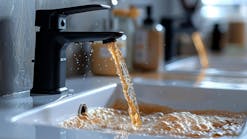An overview of major certification agencies and the certification process
In light of recent issues with pharmaceuticals in drinking water and the increased need for filtering systems in the home, it may be time to consider all of your certification agency options. Certification is a qualifying process that ensures a purchased product meets current industry standards.
In this case, standards are publications that establish accepted practices, technical requirements and terminologies for products, services and systems.
There are many standards that exist today in the drinking water industry, some of which include drinking water treatment components, chemicals, additives and complete systems. Certification agencies maintain a scope of accreditation and must operate under well-documented and implemented quality management systems and with a high level of technical and ethical standards. A certification agency must ensure adequate testing and inspection to support all certified products.
Many state legislative bodies, plumbing codes and individual cities require drinking water products to be certified by an American National Standards Institute (ANSI)-accredited certification agency before they can be installed or sold to consumers in the U.S.
Additionally, products making health claims have to be registered with California and Iowa and all products plumbed into the drinking water system have to be registered with Wisconsin and Massachusetts. Provinces in Canada require products to be certified by a Standards Council of Canada (SCC)-accredited certification agency before they can be sold to consumers.
Standardization In-Depth
ANSI was founded in 1918 and is a federation that includes standards-developing organizations, representatives of the industry, trade associations, professional and technical societies, government, the academic community, labor and consumer groups and more. ANSI provides meetings where private and public sectors can work together to develop national standards and related compliance programs.
Two of the major nontreaty international standards organizations are the International Organization of Standardization (ISO) and the International Electrotechnical Commission (IEC). ANSI provides accreditation in accordance with ISO/IEC Guide 65 for product certification programs. ISO/IEC Guide 65 specifies general requirements for bodies operating product certification programs and is intended to ensure that certification bodies act in a consistent and reliable manner. Accreditation by ANSI signifies that the procedures used by the standards body in connection with the development of American National Standards meet the Institute’s requirements.
The Standards Council of Canada (SCC) was established in 1970 and is a federal crown corporation that facilitates the development and use of national and international standards and accreditation services. The SCC reports to Parliament through the Minister of Industry and oversees Canada’s National Standards System. SCC represents Canada’s interests on standards-related matters and manages participation in the ISO and the IEC.
The SCC accredits third-party certification bodies according to the general requirements in SCC document CAN-P-3, General Requirements for Bodies Operating Product Certification Systems, in addition to the requirements of ISO/IEC Guide 65. CAN-P-3 requirements are applied so that all certification bodies accredited by SCC operate third-party certification systems in a consistent and reliable manner.
The Third Party
With all the various regulations and specifications to follow, it is beneficial for drinking water product manufacturers to choose a certification agency that is ANSI and SCC accredited. There currently are five agencies accredited by ANSI and the SCC. These agencies are the Canadian Standards Association International, NSF International, Underwriters Laboratories, Inc., the Water Quality Association and the International Association of Plumbing and Mechanical Officials.
Each agency has different policies that make it unique, but the steps to achieve product certification are relatively similar. The first step is the certification inquiry, followed by submittal of documentation, performance testing, literature review, facility inspection, and finally, certification.
To inquire about third-party certification, contact any of the ANSI- and SCC-accredited agencies. A series of questions will be asked to generate a quote and to make sure that your certification is within their scope of accreditation. Documentation will be sent out specific to your product line in order to gather scientific data and other applicable information. Once the agency receives all the information needed, a proposal for the project will be generated and test units may be requested for testing.
Your product will undergo rigorous tests to ensure compliance to the standard to which it is being certified. While testing is being completed, the product’s literature will also be evaluated to make sure it is meeting the specific requirements set forth by the standard guidelines. Manufacturing facilities will be audited to ensure that the systems being marketed, labeled and sold are the same as the systems that were tested and certified.
Once the performance testing, literature requirements and facility inspections are satisfactorily completed, the products become certified. All sections of the standard must be adhered to for the life of the product’s certification.
Once certified, the product will bear the seal of the particular agency. Because all five agencies are ANSI and SCC accredited, all five comply with most plumbing and regulatory codes in the U.S. and Canada.
Download: Here


